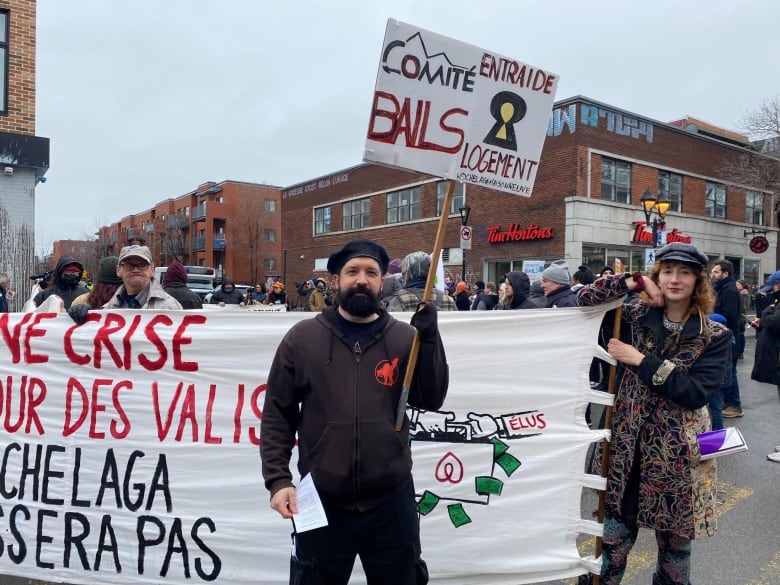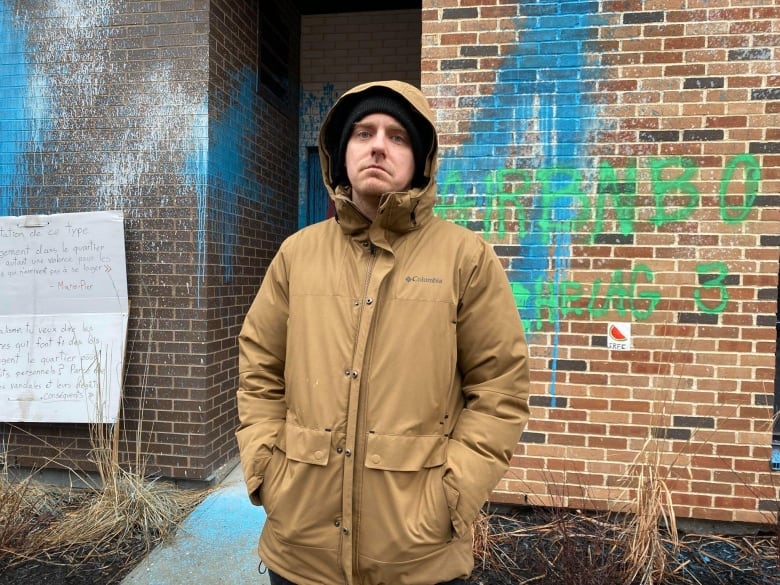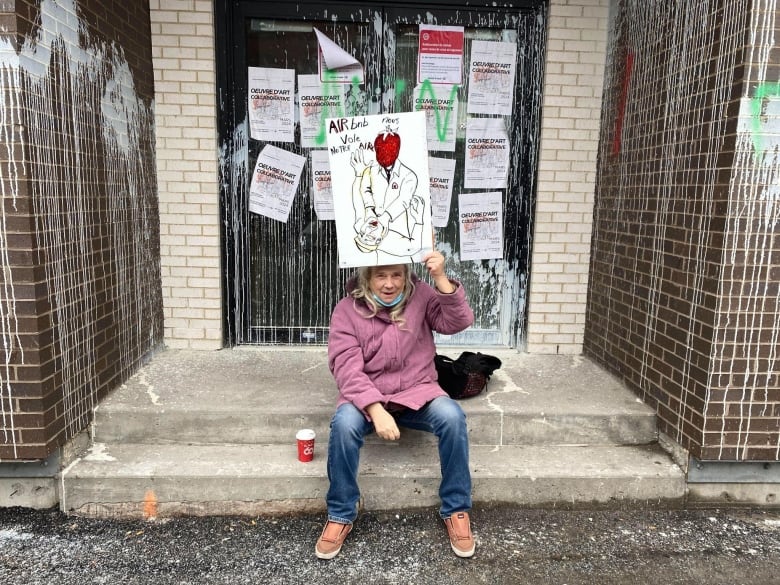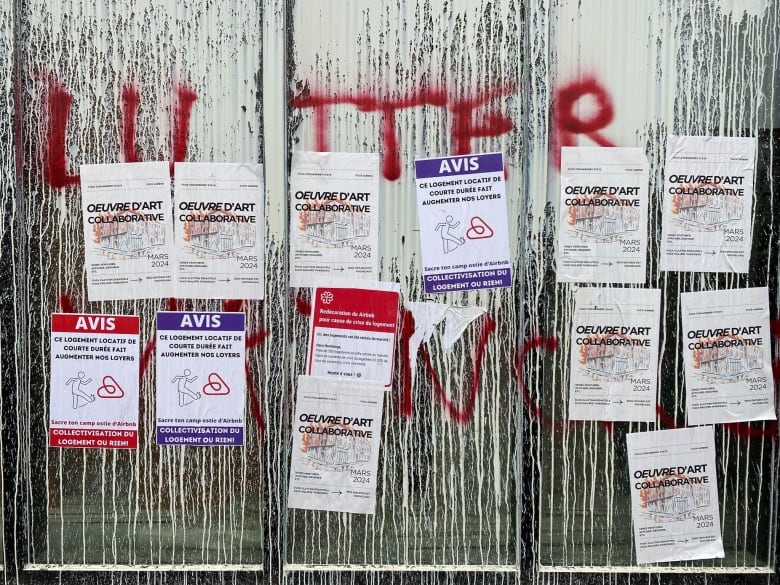The building is splattered with different shades of paint. Its doors and windows are covered with posters. The message is as clear as the graffiti sprayed across its walls: the crowd who gathered around the building on Wednesday doesn’t want Airbnbs in their neighbourhood and to them, it is a brick-and-glass symbol of housing crisis.
Carrying banners and flags, demonstrators demanded municipal and provincial leaders enforce a bylaw against short-term rentals — a bylaw the borough of Mercier–Hochelaga-Maisonneuve says it doesn’t have the power to fully implement.
Last spring, the borough banned new commercial tourist accommodations to, in its words, help protect tenants and preserve the city’s rental stock. However, it also said at the time that the bylaw doesn’t apply to owners with existing permits or people renting out their primary residence.
On Wednesday, Mercier–Hochelaga-Maisonneuve mayor Pierre Lessard-Blais confirmed that the borough did issue permits for three short-term rentals in the building.
But Les Propriétés Strawberry, the company that owns the building on Ontario Street and hosts its Airbnbs, is suing the borough and the city of Montreal to repeal the bylaw.

According to court documents reviewed by CBC, in 2021, several years before the bylaw was passed, the company received a construction permit from the borough for a three-storey building with 26 housing units. The purpose: the “construction and eventual operation of a multi-unit residential building, with the intention of renting it out in the short term,” the document reads.
Unhappy neighbours
Annie Lapalme, a community organizer at Entraide Logement Hochelaga-Maisonneuve, helped organize the protest.
“We can’t accept that real estate companies violate the regulations that we’ve fought for, to protect the rental stocks and tenants,” she said.
In her work as an organizer, Lapalme says she deals daily with people who have been renovicted and evicted, sometimes from units cleared to make way for Airbnbs
CBC reached out to Les Propriétés Strawberry to confirm if the building currently houses short-term rentals and how those units are being used, but the company did not respond.
In a written response to CBC, Airbnb confirmed that the building’s owner registered with the Corporation de l’industrie touristique du Québec (CITQ) — which issues certificates to owners who wish to rent their main residence for the short term, but only if the borough has approved.
However Airbnb refutes accusations that it is helping cause Montreal’s housing crisis. It says that the number of listings in Montreal have actually “dropped significantly over the past year” due to Quebec legislation, while rent continued to increase in the city.
Sitting on the front steps of the building, Hochelaga resident Sylvie Goulet holds up a sign depicting a man being strangled by someone with a strawberry for a head. “Airbnb is stealing our air,” it reads.

Goulet says affordable housing “no longer exists” in the neighbourhood.
Kim St-Pierre, who helps give out clothing to those in need, said she is disheartened by the presence of a building that houses some short-term rentals charging hundreds of dollars a night while “people that actually live here and contribute to the society of Hochelaga, are forced to move out, live with a bunch of people or either just live on the street.”
St-Pierre says $500 used to be enough to rent an apartment alone, but now she is paying the same amount to live with seven other roommates in Hochelaga.
Louis Beaudin-Marcoux, a member of Comité Bail, an organization that informs people about social housing in Hochelaga, says bureaucracy and a lack of will is preventing the different levels of government from cracking down on illegal short-term rentals.
In place of short-term rentals, Beaudin-Marcoux wants to see affordable and social housing units, something he says is in dire need.
Emmanuel Cree, a community organizer at the Organisation Populaire des Droits Sociaux, an organization that defends the rights of people receiving social assistance, says that the mental health of the people he works with has deteriorated and more are ending up on the street.

The blame game
The issue, according to the borough’s mayor, is that despite the bylaw, the borough lacks the power to verify if people are being honest about how they use the short-term rental space.
“If someone comes to the borough and says this apartment is my main residence, we have to believe this person because the city doesn’t have the tools to verify if this person is really telling the truth,” said Lessard-Blais.
Lessard-Blais blames a lack of Revenu Québec inspectors to make sure that short-term rentals are being used legally, adding that the borough did ask Revenu Québec to come inspect the Airbnbs at the now graffitied building on Ontario Street.
“Right now, the application of the bylaw is imperfect because we need more inspectors from Revenue Quebec, but not passing this bylaw would have been completely irresponsible.
But that’s not how Revenu Québec sees it.

Revenu Québec told CBC it doesn’t have the ability to determine whether a person is renting tourist accommodations in ways that comply with municipal bylaws and that it’s up to municipalities to ensure bylaws are enforced.
It also says it has doubled its number of tourist-accommodation inspectors.
But while the blame game continues, and the angry crowd with megaphones marches away from the building on Ontario Street, Montreal’s housing crisis continues to loom large over the streets of Hochelaga-Maisonneuve.
“You better start acting for the people who rent in this neighbourhood,” Cree said, addressing policy makers. Otherwise, he says, it will face “a social crisis.”



